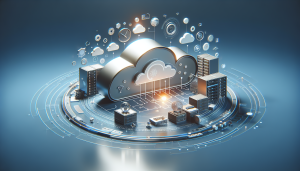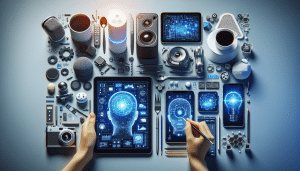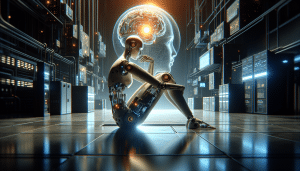Your Guide to AI-Powered Tools Transforming Everyday Life
Aiden Foster November 16, 2025
Artificial intelligence is weaving itself into daily routines, making tasks easier and smarter. This guide uncovers how AI-powered tools are quietly reshaping everything from how you work to how you learn. If you’re curious about practical tech trends, explore this deep dive into AI’s growing influence.
AI in the Home: Smart Devices Beyond the Buzz
It’s becoming common to wake up to smart speakers that adjust the lights, play your morning playlist, or answer pressing questions about the weather. Artificial intelligence has turned these once-futuristic devices into household staples. Smart displays, voice assistants, and even automated vacuums now combine machine learning algorithms with simple interfaces, making routine chores hands-free and more efficient. As these tools gather data on preferences, their capabilities only improve, enabling truly personalized experiences in home environments. This seamless integration isn’t just a fad; it’s rapidly setting a new baseline for how homes function.
AI-powered thermostats are another unsung hero quietly altering indoor comfort and energy efficiency. Instead of preset timers, modern smart thermostats learn your occupants’ behaviors and preferences. Over time, they find patterns—like when rooms are usually empty—and adjust temperatures accordingly, cutting energy waste. This edge is not only good for monthly bills but also lessens your home’s environmental footprint. These examples highlight how artificial intelligence is making home automation accessible and subtly game-changing for daily comfort and resource management (Source: https://www.energy.gov/eere/buildings/articles/artificial-intelligence-energy-smart-homes).
Security is also benefiting from the intelligent touch of AI. Home monitoring cameras now use advanced algorithms to detect unusual activity, reduce false alarms from movement like passing cars, and notify users about genuine concerns in real time. Some systems even recognize familiar faces or pets. This smart security creates peace of mind for families seeking more control and less worry. Exploring how AI integrates with personal security systems reveals a future where response times are quicker and outcomes are safer.
AI in Education: Personalized Learning and Adaptive Tools
Artificial intelligence is making classrooms more adaptive, personal, and accessible than ever before. AI-powered learning platforms provide custom-tailored lessons, adjusting content based on student strengths and areas where more review is needed. This adaptive learning helps students progress at their own pace, making it easier to master tough concepts in subjects like science and mathematics. Personalized feedback powered by data analytics ensures that learners understand their gaps and can actively address them. The days of one-size-fits-all teaching are giving way to a future where every student’s journey feels unique (Source: https://www.ed.gov/policy/gen/guid/ai-education).
Another major leap comes from AI-driven language-learning apps. These tools analyze pronunciation, grammar, and comprehension in real-time, showing where practice is needed and highlighting progress. Rather than rote memorization, students experience interactive simulations that feel like games—making the learning process enjoyable. Even those with learning difficulties stand to benefit, since AI systems are designed to adjust pace and presentation, offering support like text-to-speech or customized quizzes for complex concepts. This flexibility equips more learners to tackle challenges at their own speed and style.
In higher education, AI’s role extends to supporting research, creating virtual tutors, and helping educators refine their curriculum using real performance data. By analyzing thousands of student outcomes, instructors can quickly identify which lessons connect best or where instructional gaps lie. With a little guidance, even busy educators can use AI tools to foster more inclusive and successful learning environments. This shift means more students have access to high-quality resources regardless of their geographic or economic background, leveling the playing field in education.
Healthcare Advances: AI Making Diagnosis and Care Smarter
From medical imaging to front-desk check-ins, artificial intelligence has started to transform healthcare by making diagnosis, treatment, and patient engagement smarter. Hospitals and clinics use AI algorithms to scan X-rays and MRIs, detecting anomalies that the human eye might miss and supporting earlier intervention. Not only does this drive greater diagnostic accuracy, but it can also reduce costs and standardize care. Researchers are finding that AI-powered diagnostics are becoming essential tools for doctors, improving patient outcomes one scan at a time (Source: https://www.nih.gov/news-events/artificial-intelligence-healthcare).
AI-powered chatbots are helping patients quickly assess symptoms before visiting a provider. These tools guide users through simple questions and help them understand when they might want to seek medical attention. By prioritizing urgent cases and offering trusted information, chatbots ease the burden on healthcare staff and help patients feel heard. For those managing chronic illnesses, AI platforms track patterns in symptoms, medication adherence, and lifestyle changes, arming individuals and doctors with actionable data to personalize treatment plans.
Wearable devices, like smartwatches, leverage advanced algorithms for real-time monitoring of heart rate, oxygen levels, and even sleep quality. This constant stream of health data offers early alerts about potential issues—sometimes even before symptoms become noticeable. Harnessing this information helps patients stay proactive, with AI acting as a vigilant partner in managing health. As more health records are digital, AI analyses are also key to unlocking medical breakthroughs and streamlining complex billing procedures.
Workplace Innovation: Automating Tasks and Boosting Productivity
In the modern workplace, artificial intelligence is automating repetitive tasks—giving teams more room to focus on creative challenges and big-picture thinking. Tools like automated scheduling, email sorting, and intelligent document processing are helping professionals reclaim hours once lost to routine administration. AI-driven platforms can handle large datasets, spot anomalies, and even make recommendations for optimizing workflows, turning data into actionable insights for businesses of all sizes (Source: https://www.brookings.edu/research/artificial-intelligence-and-the-future-of-work).
AI is also empowering teams to collaborate better. Virtual meeting assistants transcribe meetings live, flag action items, and help distribute follow-up notes instantly. Project management platforms use machine learning to predict potential bottlenecks and recommend adjustments, leading to less wasted time. This proactive approach ensures goals are met more consistently, with fewer surprises and missed deadlines. Artificial intelligence in the workforce fuels a feedback loop of ongoing improvement and smoother communication for remote or distributed teams.
Recruiting has become more inclusive and efficient thanks to AI-powered resume analysis. Rather than sifting through piles of applications manually, HR tools now pinpoint candidates based on specific skills and qualifications, helping ensure a fairer hiring process. Biases can be flagged—if not eliminated—by allowing machine learning algorithms to detect trends not always clear to humans. From onboarding to professional growth, AI-infused platforms are redefining how organizations attract and grow talent for long-term success.
Entertainment and Creativity: How AI Inspires New Experiences
Entertainment has always marched in step with technology, and artificial intelligence is amplifying creative possibilities in exciting ways. Streaming platforms now serve up recommendations tailor-made for each viewer’s tastes, blending human curation with AI algorithms that study past behavior. Personalized playlists or film suggestions keep engagement high, transforming how you discover stories, music, and art. These subtle improvements make entertainment more enjoyable and immersive, adding value beyond the traditional channel guide (Source: https://www.npr.org/2021/12/07/1061835248/artificial-intelligence-entertainment).
Artificial intelligence is playing a role behind the scenes, too. Script analysis, video editing, and music composition tools powered by machine learning accelerate the production process, freeing up writers, composers, and directors to experiment. AI-generated artwork and songs may sound futuristic, but these creative collaborations are becoming more mainstream. Platforms allow artists to try new styles or generate ideas rapidly, helping push creative boundaries in ways that were once unimaginable.
Gamers are seeing AI’s hand in smarter, more unpredictable characters and in-game experiences. By continuously adapting to player actions, AI-driven worlds become dynamic and engaging. Virtual assistants can help solve puzzles or navigate game worlds, while procedural music ensures that soundtracks are unique for every playthrough. This layering of tech and creativity is carving out a future where digital entertainment feels alive, evolving with every interaction.
Managing Data and Privacy: Navigating Trust in a Connected World
With great power comes the need for responsibility. AI’s spread into daily life calls for careful attention to data security and privacy. Many modern tools rely on massive amounts of information to function well, including location, preferences, and even biometric data. Providers use advanced encryption and anonymization techniques to safeguard this information, but ongoing vigilance is crucial. Transparent data usage policies build trust, letting users know what information is collected and how it’s handled (Source: https://privacyrights.org/resources/artificial-intelligence-and-privacy).
Managing permissions on AI-powered apps is a best practice for anyone concerned about digital footprints. Most platforms now allow users to adjust privacy settings, review data access requests, or delete stored data on demand. Staying informed about new features, app updates, or changing regulations is equally important; this literacy ensures people are not caught off guard by hidden privacy risks. Building good digital habits around AI tools empowers individuals to take charge of their online identity.
Government and industry standards are playing catch-up with the rapid evolution of artificial intelligence. Agencies and research organizations frequently release new guidelines for ethical AI, data sharing, and consent. Complying with these standards not only protects consumers but also preserves the integrity of innovative tech. The next wave of AI-powered tools will likely prioritize explainability, letting users see and understand exactly how decisions are made—a step that could make people more confident about integrating AI into their lives.
References
1. U.S. Department of Energy. (n.d.). Artificial Intelligence Powers Energy-Smart Homes. Retrieved from https://www.energy.gov/eere/buildings/articles/artificial-intelligence-energy-smart-homes
2. U.S. Department of Education. (n.d.). Artificial Intelligence and the Future of Teaching and Learning. Retrieved from https://www.ed.gov/policy/gen/guid/ai-education
3. National Institutes of Health. (n.d.). Artificial Intelligence in Healthcare: Transforming the Practice of Medicine. Retrieved from https://www.nih.gov/news-events/artificial-intelligence-healthcare
4. Brookings Institution. (n.d.). Artificial Intelligence and the Future of Work. Retrieved from https://www.brookings.edu/research/artificial-intelligence-and-the-future-of-work
5. NPR. (2021). Artificial Intelligence in Entertainment. Retrieved from https://www.npr.org/2021/12/07/1061835248/artificial-intelligence-entertainment
6. Privacy Rights Clearinghouse. (n.d.). Artificial Intelligence and Privacy. Retrieved from https://privacyrights.org/resources/artificial-intelligence-and-privacy








